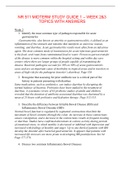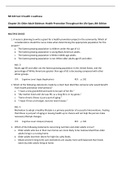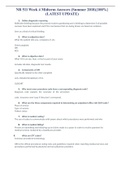Nr 536 week 3 - Study guides, Class notes & Summaries
Looking for the best study guides, study notes and summaries about Nr 536 week 3? On this page you'll find 14 study documents about Nr 536 week 3.
Page 2 out of 14 results
Sort by

-
NR 511 MIDTERM STUDY GUIDE 1 – WEEK 2&3 TOPICS WITH ANSWERS
- Exam (elaborations) • 28 pages • 2023
-
- $14.99
- + learn more
NR 511 MIDTERM STUDY GUIDE 1 – WEEK 2&3 TOPICS WITH ANSWERS Week 2 1. Identify the most common type of pathogen responsible for acute gastroenteritis Gastroenteritis, also known as enteritis or gastroenterocolitis, is defined as an inflammation of the stomach and intestine that manifests as anorexia, nausea, vomiting, and diarrhea. Acute gastroenteritis results most often from an infectious agent. The most common mode of transmission for acute infectious gastroenteritis is the fecal...

-
NR 222 test 3 health n wellness latest Chamberlain
- Exam (elaborations) • 56 pages • 2021
- Available in package deal
-
- $9.99
- + learn more
NR 222 test 3 health n wellness Chapter 24: Older Adult Edelman: Health Promotion Throughout the Life Span, 8th Edition MULTIPLE CHOICE 1. A nurse is planning to write a grant for a health promotion project in the community. Which of considerations should the nurse make when determining the appropriate population for this project? a. The fastest growing population is children under the age of 12. b. The fastest growing population is young Black American adults. c. The fastest growing p...

-
NR 511 Week 4 Midterm Answers (Summer 2018){100%}(LATEST UPDATE)
- Exam (elaborations) • 11 pages • 2021
-
- $27.49
- + learn more
NR 511 Week 4 Midterm Answers (Summer 2018) 1. Define diagnostic reasoning Reflective thinking because the process involves questioning one’s thinking to determining if all possible avenues have been explored and if the conclusions that are being drawn are based on evidence. *Seen as a kind of critical thinking. 2. Discuss and identify subjective & objective data - Subjective: What the pt tells you, complains of, etc. *Chief complaint, HPI, ROS - Objective: What YOU can see, hear, or feel as p...

Study stress? For sellers on Stuvia, these are actually golden times. KA-CHING! Earn from your study resources too and start uploading now. Discover all about earning on Stuvia


